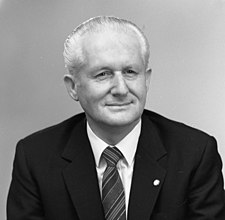Jens Pohl
This article is incomplete because it is pending further input from participants, or it is a work-in-progress by one author. Please comment on this article's talk page to share your input, comments and questions. Note: To contribute to this article, you may need to seek help from the author(s) of this page. |
Jens Pohl | |
|---|---|
 Official photo, 1976 | |
| Chancellor of the Vierz Empire | |
| In office 27 April 1967 – 14 February 1977 | |
| Monarch | Alexander II Viktor IV |
| Preceded by | Hans Richter |
| Succeeded by | Philipp Lorenz |
| Minister of Foreign Affairs | |
| In office 10 June 1964 – 27 April 1967 | |
| Monarch | Alexander II |
| Chancellor | Otto Wagner Hans Richter |
| Preceded by | Siegmund Gehrke |
| Succeeded by | Torsten Hagmann |
| Reichskommissar for Apelia (East Apelia) | |
| In office 9 December 1956 – 10 June 1964 | |
| Monarch | Alexander II |
| Chancellor | Otto Wagner Hans Richter |
| Preceded by | Albert Jonke |
| Succeeded by | Helibert Schumacher |
| Deputy Minister of Foreign Affairs | |
| In office 18 August 1954 – 5 December 1958 | |
| Chancellor | Thomas Weber Otto Wagner |
| Minister | Siegmund Gehrke |
| Preceded by | Heinz Rieger |
| Succeeded by | Gunter Fährmann |
| Personal details | |
| Born | Jens Erhard Pohl 3 November 1908 Oftfeld, Lonzig, Vierz Empire |
| Died | 7 October 1981 (aged 73) Adtrüs, Vierz Empire |
| Alma mater | University of Wilsbüren Imperial Political Institute |
| Military service | |
| Allegiance | |
| Branch/service | Imperial Vierz Army |
| Years of service | 1927–1945 |
| Unit |
|
Jens Erhard Pohl (3 November 1908 – 11 July 1981) was a Vierz statesman who served as Chancellor of the Vierz Empire from 1967 to 1977. Prior to his chancellorship, he held a number of positions in the foreign ministry, including that of foreign minister from 1964 to 1967.
Pohl was born to a working-class family in the village of Ostfeld in eastern Lonzig. While performing his mandatory military service, Pohl saw combat in the Great War, where he was wounded-in-action. He studied at the University of Wilsbüren after the war, graduating in 1950, and thereafter studied political science at the Imperial Political Institute until 1952. Pohl gained employment at the foreign ministry shortly thereafter, and was made Reichskommissar for Apelia from 1956 to 1964, where he had tremendous sway over the country's government. He quickly gained favour with Kaiser Alexander II, who made him foreign minister in 1964. Pohl's success in negotiating with Legatia during the Silent War propelled him to the position of Chancellor in 1967.
Identifying with the national conservative wing of the state, Pohl moved quickly to centralize power and suppress the "democratic movement" within the government and refuse the influence of the Kaiser – reestablishing the principle of Kanzlerwirksamkeit (efficacy of [the] chancellor). He issued a number of decrees limiting freedom of the press and speech, and curbing the power of the states. Pohl expanded investment in petroleum extraction in West Oridia, while limiting the economic power of the colonial authorities. He was also influential in the expansion of natalist policies, as he instructed the immigration ministry to curb immigration from the colonies as well as emigration from Vierzland.
Pohl's foreign policy ended the brief period of detente between Vierzland and Legatia. Referring to Legatia as an "authentically un-Patyrian" state, he preferred a policy of 'direct confrontation' with Vierzland's geopolitical rival. In response to Legatia's placement of ICBMs in Talenna, Pohl ordered the closure of the Straits of Vell, causing an international crisis that was solved only after months of threats of global thermonuclear war. From 1976 until the end of his term, Pohl ordered a violent crackdown on protesters in Luepola during the uprising period, drawing international condemnation.
The Straits Crisis, the deteriorating situation in Luepola, and a poor domestic economic situation onset by international sanctions and oil prices led Pohl to fall out of favour with Alexander II and his successor, Viktor IV. He was dismissed from his position in 1977, and placed under house arrest until 1978. He died in Adtrüs in 1981 at the age of 73.